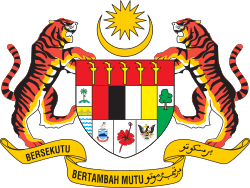State legislative assemblies of Malaysia
 |
| This article is part of a series on the politics and government of Malaysia |
|
|
A state legislative assembly (Malay: Dewan Undangan Negeri, DUN; also known simply as state assembly) is the legislative branch of the state governments of each of the 13 Malaysian states. Members of a state legislative assembly comprises elected representatives from single-member constituencies during state elections through the first-past-the-post system.
The assemblies have powers to enact state laws as provided for by the Constitution of Malaysia. The majority party in each assembly forms the state government, and the leader of the majority party becomes menteri besar (for states with hereditary rulers) or chief minister (for states without hereditary rulers) of the state. After the March 2008 general election, the Barisan Nasional coalition were the majority party in eight states, while the opposition won five states. In February 2009, BN regained Perak after 3 Pakatan Rakyat assembly members defected.
The state legislative assemblies are unicameral, unlike the bicameral Parliament of Malaysia. The hereditary rulers or Yang di-Pertua Negeri (governors) are vested with powers to dissolve their respective state legislative assemblies on the advice of the menteri besar or chief minister. Once dissolved, elections must be carried out within an interim period of sixty (60) days. Usually, state elections are held simultaneously with the federal parliamentary elections, with the exception of Sarawak, and before 2004, Sabah.
List of State Legislative Assemblies in Malaysia
The list excludes Kuala Lumpur, Putrajaya and Labuan as Federal Territories do not have state legislative assemblies and are governed directly by the federal government under the Ministry of Federal Territories together with local authorities, namely the Kuala Lumpur City Hall, Putrajaya Corporation and Labuan Corporation respectively.
| State (incl. Season) | Seats (2016) | Population (2010) | Population/seat | Majority party | Speaker |
|---|---|---|---|---|---|
| 56 | 3,348,283 | 59,791 | BN | Mohamad Aziz | |
| 36 | 1,947,651 | 54,101 | BN | Md. Rozai Safian | |
| 45 | 1,539,601 | 34,213 | PAS | Abdullah Ya'kub | |
| 28 | 821,110 | 29,325 | BN | Othman Muhamad | |
| 42 | 1,500,817 | 35,734 | BN | Ishak Muhammad | |
| 59 | 2,352,743 | 39,877 | BN | S. Thangeswary | |
| 15 | 231,541 | 15,436 | BN | Hamdan Bahari | |
| 40 | 1,561,383 | 39,035 | PH | Law Choo Kiang | |
| 56 | 5,462,141 | 97,538 | PH | Hannah Yeoh | |
| 36 | 1,021,064 | 28,363 | BN | Dr. Awaluddin Said | |
| 32 | 1,035,977 | 32,374 | BN | Mohd. Zubir Embong | |
| 82 | 2,471,140 | 30,136 | BN | Syed Abas Syed Ali | |
| 60 | 3,206,742 | 53,446 | BN | Mohd. Asfia Awang Nassar |
List of State Assembly Representatives in Malaysia
- List of Malayan State and Settlement Council Representatives (1954–59)
- List of Malaysian State Assembly Representatives (1959–64)
- List of Malaysian State Assembly Representatives (1964–69)
- List of Malaysian State Assembly Representatives (1969–74)
- List of Malaysian State Assembly Representatives (1974–78)
- List of Malaysian State Assembly Representatives (1978–82)
- List of Malaysian State Assembly Representatives (1982–86)
- List of Malaysian State Assembly Representatives (1986–90)
- List of Malaysian State Assembly Representatives (1990–95)
- List of Malaysian State Assembly Representatives (1995–99)
- List of Malaysian State Assembly Representatives (1999–2004)
- List of Malaysian State Assembly Representatives (2004–08)
- List of Malaysian State Assembly Representatives (2008–13)
- List of Malaysian State Assembly Representatives (2013–)
Current composition
References |